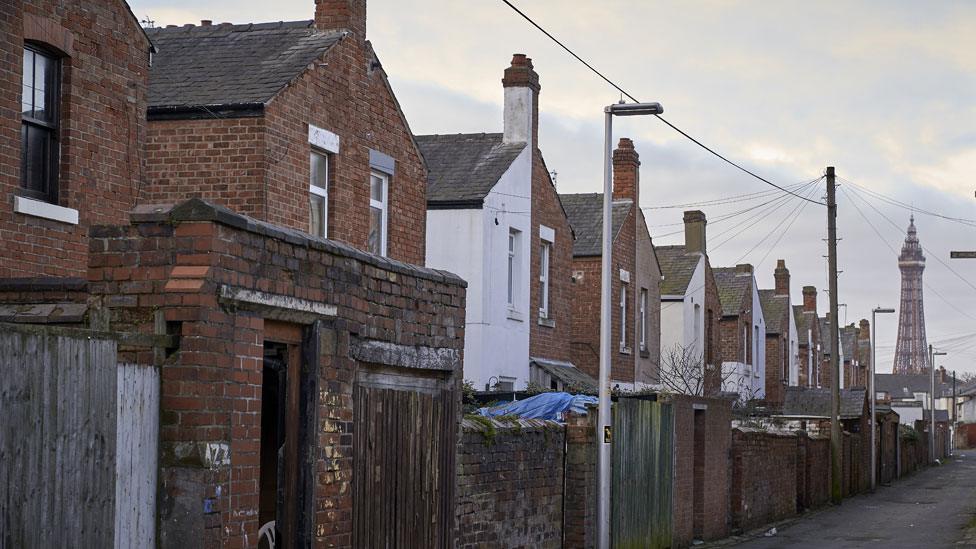Coronavirus: Call for £700 catch-up premium for poorer pupils
- Published

There are concerns the gap between disadvantaged pupils and their classmates will widen as a result of school closures
A catch-up premium of £700 for every pupil on free school meals should be given to secondary schools when they reopen, say northern MPs and peers.
They believe such a premium would help prevent poorer children in England falling behind their classmates because of school closures due to Covid-19.
It would fund up to two-and-a-half hours of tuition for six to 12 weeks.
Fifty MPs from the North have written to Education Secretary Gavin Williamson to make the case for £300m of funding.
Mr Williamson appeared before the Education Select Committee on Wednesday morning, to face questions about the Department for Education's response to the coronavirus outbreak.
Two MPs who sit on the committee have signed the letter - Ian Mearns, Labour MP for Gateshead, and Christian Wakeford, Conservative MP for Bury South.
Robert Halfon, a senior Conservative MP who chairs the committee, has already called for a such catch-up premium.
'Most vulnerable'
In a letter to Mr Williamson, the Northern Powerhouse Partnership says the current situation has kept children away from their teachers and schools.
"The most disadvantaged children fall behind their peers over a long summer holiday, and the shutdown will widen the North's disadvantage gap, and with it the North-South education divide," it says.
"We need to deal with the consequences of this crisis for the most vulnerable in our society, and that must include children from low-income households."
The letter says children from the North of England are particularly likely to be from economic and ethnic groups that make the slowest progress at secondary school, including white working-class pupils.
Providing disadvantaged children with computers and connectivity is "a welcome first step", the letter says, but these children need long-term support.
"A catch-up premium of £300m across England is what is required - an entitlement of at least £700 for every secondary school pupil on free school meals - to fund timely interventions which would require around 30 minutes of tuition, three to five times a week over a six to 12-week period."
North-South education divide
Official statistics show the North East has the highest percentage of children on free school meals at 18.7%, followed by London at 17.4% and the North West at 16.8%, while the South East has the lowest percentage at 9.5%.
This compares with an average in England of 14.1%
"Schoolchildren in the North from longstanding disadvantaged backgrounds were already falling behind their peers in other parts of the country, widening the North-South divide in educational attainment," said NPP vice-chairman Lord O'Neill.
"The Covid-19 crisis has made that situation even worse, as many children have little or no learning resources at home.
"The catch-up premium today supported by so many of our MPs and peers from all parties is vital to allow children all over the North, and the whole of the nation, to have the same chances as everyone else.
"Otherwise we risk those affected falling even further behind, possibly never to catch-up."
Making sure no child falls behind
Peter Ashworth, chief executive of Cidari multi academy trust, which has schools in Blackpool, Blackburn and East Lancashire, says a catch-up premium would be welcome as many of his families are working in low wage jobs.
"It would be welcome, as we need to make an effort to ensure no one is left behind. Additional funding would be beneficial."
Mr Ashworth said it would be best if schools and teaching professionals had the freedom to design tuition programmes themselves.
"Heads will have a deep understanding of where their children were before lockdown and it would be fantastic if schools had the flexibility to use funding where needed, like pupil premium."
A Department for Education spokeswoman responded: "We will do everything possible to make sure no child, whatever their background, falls behind as a result of coronavirus.
"The government has already committed over £100m to support remote education, including providing devices and internet access to those children who need it most."
Schools were also continuing to receive the pupil premium to help them support their disadvantaged pupils, she added.
"The department is considering, with a range of partner organisations, how best to support all pupils to make up for time out of school."

A SIMPLE GUIDE: How do I protect myself?
AVOIDING CONTACT: The rules on self-isolation and exercise
HOPE AND LOSS: Your coronavirus stories
LOOK-UP TOOL: Check cases in your area
